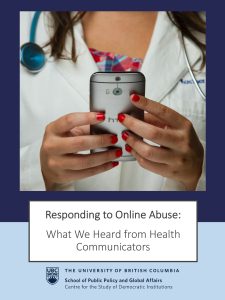The pandemic created an unprecedented demand for health communication. Public health officials, health experts, and medical practitioners increased their engagement online to address a surge in public demand for information. To play these roles, health communicators intensified their use of social media platforms. Some health communicators identified specific underserved communities to address, such as the South Asian community, the Black community, seniors, and the homeless or under-housed. They also tried to address widespread misinformation (created inadvertently), and disinformation (intentionally spread for political and economic aims).
In making these efforts, health communicators too often faced abuse or threats. A global survey by Nature of scientists who discussed the pandemic on news media or social media found over two-thirds reported negative experiences, 22 per cent received threats of physical or sexual violence, and 15 per cent received death threats.
Many Canadian news articles have documented online abuse of health communicators, but to date there is no rigorous research on the topic. Nor are there detailed recommendations for how individuals and institutions should address this problem. To help fill this gap, we hosted workshops with health communicators on January 26, 2023 (21 participants) and March 6, 2023 (16 participants). Participants included chief medical officers, communications staff for public health authorities, nurses, physicians, independent science communicators, and communicators at civil society health organizations.

This report summarizes insights from those workshops, along with current scholarship, regarding:
- forms of online abuse on different platforms;
- impacts of online abuse;
- relationship between online abuse and the personal identities of health communicators;
- forms of support that health communicators access, or wish to access;
- possible next steps for research or advocacy.
Initial findings from these workshops will contribute to further research, peer-reviewed scholarship, policy publications, and public-facing products such as podcasts and op-eds.
This report was written by Chris Tenove, Heidi Tworek, Sabah Haque, Hanna Hett, and Oliver Oliver Zhang. Additional research from Elizabeth Dubois, Saima Hirani, Jaigris Hodson, Maliha Siddiqi, and George Veletsianos. Thanks to the folks at ScienceUpFirst, who helped us to find workshop participants.
Thank you to the workshop participants for their valuable time and thoughts.
This research is funded by the New Frontiers in Research Fund from the Social Sciences and Humanities Research Council, council grant number NFRFR-2021-00289. The principal investigator is Canada Research Chair Heidi Tworek, professor of history and public policy at the University of British Columbia.
Further details on the research team and acknowledgments can be found in the report.
Citation: Tenove, Chris, Heidi Tworek, Sabah Haque, Hanna Hett, Oliver Zhang. (2023) Responding to Online Abuse: What We Heard from Health Communicators. Vancouver: Centre for the Study of Democratic Institutions, University of British Columbia.
This work is licensed under CC BY-NC-ND 4.0 (creativecommons.org/licenses/by-nc-nd/4.0).